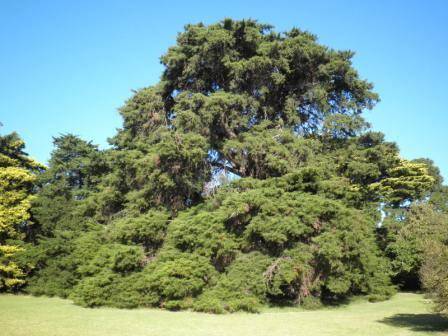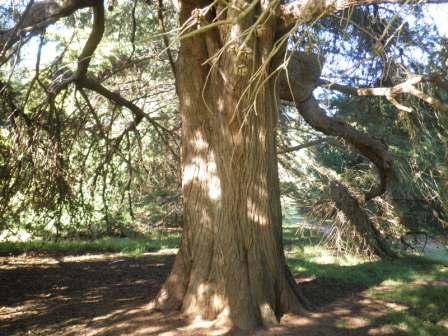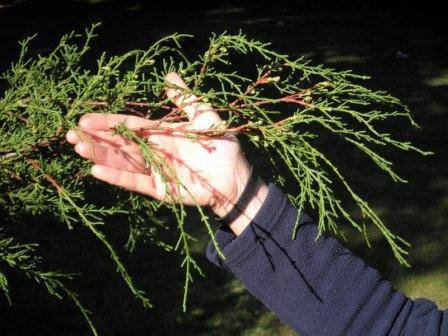| Back to search results » | Back to search page » |
|
Hesperocyparis macrocarpa 'Filipendula'
Other NameWeeping Monterey Cypress LocationWerribee Park Mansion, 320 K Road,, WERRIBEE VIC 3030 - Property No T12179
File NumberT12179LevelState |
|
Statement of Significance
What is significant?
Horticultural value
Contribution to landscape of historic garden
Rare or localised
Outstanding size
Curious growth form
Historical value
Outstanding example of species
This Monterey Cypress (Hesperocyparis macrocarpa) was re-identified by the Committee in 2022, having been formerly listed as Weeping Monterey Cypress (Hesperocyparis macrocarpa 'Filipendula'). Located south-east of the Ulmus minor 'Variegata' or Silver Elm (T11243) in the formal garden, it represents the extreme genetic and botanical variability of the Monterey Cypress species. This late nineteenth century specimen is very rare and not propagated in today's nursery industry. It has high genetic and propagation stock potential. This cypress specimen was selected and planted circa.1877 by the gardeners employed by Thomas Chirnside at Werribee Park. The Chirnside Family's contribution to Victoria's pastoral and agricultural growth is notable. as leaders and pioneers of the colony's pastoral industry. Their vast land holdings in Victoria, New South Wales, South Australia and Queensland made them one of the wealthiest families in the colony. The grandeur of their influence and wealth is reflected in their opulent Roman Renaissance Revival style mansion at Werribee Park and is stately garden.
This tree has developed a tall leader trunk and its foliage weepstowards the ground. Its unique growth habit distinguishes it from its species and any other species cultivars growing in the garden. It is typical of the type of foliage and architectural form that nineteenth century garden enthusiasts with large rural estates collected and introduced to make their new homeland feel more "European."
Measurements: 16/04/2012
Spread (m): E-W 22; N-S 21
Girth (m): 3.45
Height (m): 20.1
Estimated Age (yrs): 135
Condition: Good
Measurements: 08/12/2022
Spread (m): E-W 19.2, N-S 22.8
Girth (m): 3.53
Height (m): 19.7
Condition: Excellent
Access: Unrestricted
Classified: 24/09/2012
Contribution to landscape of historic garden
Rare or localised
Outstanding size
Curious growth form
Historical value
Outstanding example of species
This Monterey Cypress (Hesperocyparis macrocarpa) was re-identified by the Committee in 2022, having been formerly listed as Weeping Monterey Cypress (Hesperocyparis macrocarpa 'Filipendula'). Located south-east of the Ulmus minor 'Variegata' or Silver Elm (T11243) in the formal garden, it represents the extreme genetic and botanical variability of the Monterey Cypress species. This late nineteenth century specimen is very rare and not propagated in today's nursery industry. It has high genetic and propagation stock potential. This cypress specimen was selected and planted circa.1877 by the gardeners employed by Thomas Chirnside at Werribee Park. The Chirnside Family's contribution to Victoria's pastoral and agricultural growth is notable. as leaders and pioneers of the colony's pastoral industry. Their vast land holdings in Victoria, New South Wales, South Australia and Queensland made them one of the wealthiest families in the colony. The grandeur of their influence and wealth is reflected in their opulent Roman Renaissance Revival style mansion at Werribee Park and is stately garden.
This tree has developed a tall leader trunk and its foliage weepstowards the ground. Its unique growth habit distinguishes it from its species and any other species cultivars growing in the garden. It is typical of the type of foliage and architectural form that nineteenth century garden enthusiasts with large rural estates collected and introduced to make their new homeland feel more "European."
Measurements: 16/04/2012
Spread (m): E-W 22; N-S 21
Girth (m): 3.45
Height (m): 20.1
Estimated Age (yrs): 135
Condition: Good
Measurements: 08/12/2022
Spread (m): E-W 19.2, N-S 22.8
Girth (m): 3.53
Height (m): 19.7
Condition: Excellent
Access: Unrestricted
Classified: 24/09/2012
How is it significant?
Horticultural value
Contribution to landscape of historic garden
Rare or localised
Outstanding size
Curious growth form
Historical value
Outstanding example of species
This Monterey Cypress (Hesperocyparis macrocarpa) was re-identified by the Committee in 2022, having been formerly listed as Weeping Monterey Cypress (Hesperocyparis macrocarpa 'Filipendula'). Located south-east of the Ulmus minor 'Variegata' or Silver Elm (T11243) in the formal garden, it represents the extreme genetic and botanical variability of the Monterey Cypress species. This late nineteenth century specimen is very rare and not propagated in today's nursery industry. It has high genetic and propagation stock potential. This cypress specimen was selected and planted circa.1877 by the gardeners employed by Thomas Chirnside at Werribee Park. The Chirnside Family's contribution to Victoria's pastoral and agricultural growth is notable. as leaders and pioneers of the colony's pastoral industry. Their vast land holdings in Victoria, New South Wales, South Australia and Queensland made them one of the wealthiest families in the colony. The grandeur of their influence and wealth is reflected in their opulent Roman Renaissance Revival style mansion at Werribee Park and is stately garden.
This tree has developed a tall leader trunk and its foliage weepstowards the ground. Its unique growth habit distinguishes it from its species and any other species cultivars growing in the garden. It is typical of the type of foliage and architectural form that nineteenth century garden enthusiasts with large rural estates collected and introduced to make their new homeland feel more "European."
Measurements: 16/04/2012
Spread (m): E-W 22; N-S 21
Girth (m): 3.45
Height (m): 20.1
Estimated Age (yrs): 135
Condition: Good
Measurements: 08/12/2022
Spread (m): E-W 19.2, N-S 22.8
Girth (m): 3.53
Height (m): 19.7
Condition: Excellent
Access: Unrestricted
Classified: 24/09/2012
Contribution to landscape of historic garden
Rare or localised
Outstanding size
Curious growth form
Historical value
Outstanding example of species
This Monterey Cypress (Hesperocyparis macrocarpa) was re-identified by the Committee in 2022, having been formerly listed as Weeping Monterey Cypress (Hesperocyparis macrocarpa 'Filipendula'). Located south-east of the Ulmus minor 'Variegata' or Silver Elm (T11243) in the formal garden, it represents the extreme genetic and botanical variability of the Monterey Cypress species. This late nineteenth century specimen is very rare and not propagated in today's nursery industry. It has high genetic and propagation stock potential. This cypress specimen was selected and planted circa.1877 by the gardeners employed by Thomas Chirnside at Werribee Park. The Chirnside Family's contribution to Victoria's pastoral and agricultural growth is notable. as leaders and pioneers of the colony's pastoral industry. Their vast land holdings in Victoria, New South Wales, South Australia and Queensland made them one of the wealthiest families in the colony. The grandeur of their influence and wealth is reflected in their opulent Roman Renaissance Revival style mansion at Werribee Park and is stately garden.
This tree has developed a tall leader trunk and its foliage weepstowards the ground. Its unique growth habit distinguishes it from its species and any other species cultivars growing in the garden. It is typical of the type of foliage and architectural form that nineteenth century garden enthusiasts with large rural estates collected and introduced to make their new homeland feel more "European."
Measurements: 16/04/2012
Spread (m): E-W 22; N-S 21
Girth (m): 3.45
Height (m): 20.1
Estimated Age (yrs): 135
Condition: Good
Measurements: 08/12/2022
Spread (m): E-W 19.2, N-S 22.8
Girth (m): 3.53
Height (m): 19.7
Condition: Excellent
Access: Unrestricted
Classified: 24/09/2012
Why is it significant?
Horticultural value
Contribution to landscape of historic garden
Rare or localised
Outstanding size
Curious growth form
Historical value
Outstanding example of species
This Monterey Cypress (Hesperocyparis macrocarpa) was re-identified by the Committee in 2022, having been formerly listed as Weeping Monterey Cypress (Hesperocyparis macrocarpa 'Filipendula'). Located south-east of the Ulmus minor 'Variegata' or Silver Elm (T11243) in the formal garden, it represents the extreme genetic and botanical variability of the Monterey Cypress species. This late nineteenth century specimen is very rare and not propagated in today's nursery industry. It has high genetic and propagation stock potential. This cypress specimen was selected and planted circa.1877 by the gardeners employed by Thomas Chirnside at Werribee Park. The Chirnside Family's contribution to Victoria's pastoral and agricultural growth is notable. as leaders and pioneers of the colony's pastoral industry. Their vast land holdings in Victoria, New South Wales, South Australia and Queensland made them one of the wealthiest families in the colony. The grandeur of their influence and wealth is reflected in their opulent Roman Renaissance Revival style mansion at Werribee Park and is stately garden.
This tree has developed a tall leader trunk and its foliage weepstowards the ground. Its unique growth habit distinguishes it from its species and any other species cultivars growing in the garden. It is typical of the type of foliage and architectural form that nineteenth century garden enthusiasts with large rural estates collected and introduced to make their new homeland feel more "European."
Measurements: 16/04/2012
Spread (m): E-W 22; N-S 21
Girth (m): 3.45
Height (m): 20.1
Estimated Age (yrs): 135
Condition: Good
Measurements: 08/12/2022
Spread (m): E-W 19.2, N-S 22.8
Girth (m): 3.53
Height (m): 19.7
Condition: Excellent
Access: Unrestricted
Classified: 24/09/2012
Contribution to landscape of historic garden
Rare or localised
Outstanding size
Curious growth form
Historical value
Outstanding example of species
This Monterey Cypress (Hesperocyparis macrocarpa) was re-identified by the Committee in 2022, having been formerly listed as Weeping Monterey Cypress (Hesperocyparis macrocarpa 'Filipendula'). Located south-east of the Ulmus minor 'Variegata' or Silver Elm (T11243) in the formal garden, it represents the extreme genetic and botanical variability of the Monterey Cypress species. This late nineteenth century specimen is very rare and not propagated in today's nursery industry. It has high genetic and propagation stock potential. This cypress specimen was selected and planted circa.1877 by the gardeners employed by Thomas Chirnside at Werribee Park. The Chirnside Family's contribution to Victoria's pastoral and agricultural growth is notable. as leaders and pioneers of the colony's pastoral industry. Their vast land holdings in Victoria, New South Wales, South Australia and Queensland made them one of the wealthiest families in the colony. The grandeur of their influence and wealth is reflected in their opulent Roman Renaissance Revival style mansion at Werribee Park and is stately garden.
This tree has developed a tall leader trunk and its foliage weepstowards the ground. Its unique growth habit distinguishes it from its species and any other species cultivars growing in the garden. It is typical of the type of foliage and architectural form that nineteenth century garden enthusiasts with large rural estates collected and introduced to make their new homeland feel more "European."
Measurements: 16/04/2012
Spread (m): E-W 22; N-S 21
Girth (m): 3.45
Height (m): 20.1
Estimated Age (yrs): 135
Condition: Good
Measurements: 08/12/2022
Spread (m): E-W 19.2, N-S 22.8
Girth (m): 3.53
Height (m): 19.7
Condition: Excellent
Access: Unrestricted
Classified: 24/09/2012
Group
Parks, Gardens and Trees
Category
Tree











